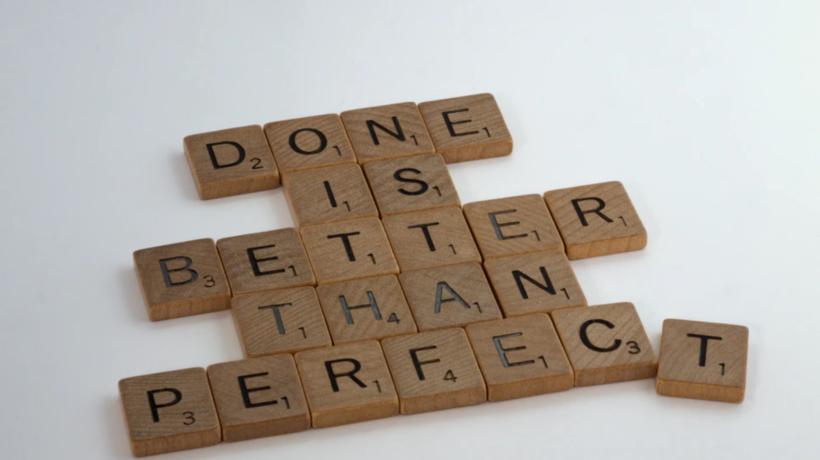I can admit it—I’m a recovering perfectionist. By this I mean, my way of reacting to uncertainty often involves trying to execute everything flawlessly—to be everywhere and available to everyone, sometimes to my own detriment.
I’ve been known to burn the candle at both ends trying to get a project just right. But what I’ve learned in recent years (and this year especially) is that avoiding any kind of mishap won’t help me move the needle forward as a CEO.
When running a business, so many factors remain out of our control, particularly now. This isn’t to say we should embrace complacency, but we also shouldn’t allow ourselves to be hijacked by our mistakes. In fact, according to coauthors Rasmus Hougaard and Jacqueline Carter, an unhealthy fixation on perfection can even slow us down when it matters most.
“In a crisis, when reality is changing by the day (or even by the hour), when there is no way of knowing with certainty what lies ahead or the best course of action to take, there is no time for perfection,” they note in a story for Harvard Business Review. “Suddenly, perfectionism has become a liability.”
There’s no denying that the current landscape we’re living in demands our close attention. But the truth is, perfectionism is harmful even without a global pandemic throwing a wrench into our routines.
In the past 14 years I’ve spent building my company, JotForm, I’ve found the following strategies helpful in learning to embrace failure and focus on the bigger picture.
LEAVE YOUR EGO AT THE DOOR
In my experience, most leaders tend to be intense perfectionists. And I have to note, this way of doing things isn’t necessarily bad. It drives innovation and the pursuit of excellence. But it can be harmful when it keeps us in the “self-blame game”—a vicious cycle of rehashing every little error and looking it over with a magnifying glass.
I’ve learned that when we mentally berate ourselves, this only keeps us from seeing new opportunities, thereby killing our ability to be agile. “Our egos tend to be attached to our past successes and how things used to be,” write Hougaard and Carter for HBR. “When everything gets upended, and our past successes and usual approaches are suddenly not relevant anymore, our ego hurts. We begin to hold on even tighter to the world we used to know and understand.”
What is the remedy? Try on some selflessness, for a change. The authors recommend extracting ego from the situation before you show up for work (or sign into your Zoom meeting) every day.
For leaders, this boils down to being honest, asking for advice and perspective, admitting you don’t have all the answers, and “recognising that it takes more than two eyes to look into an unknown future,” say the authors.
REMEMBER THAT SUCCESS ISN’T LINEAR
When I launched my startup, I knew that I would build my business slowly and steadily. This decision relieved enormous pressure to focus on improving our product rather than fixating on insane growth.
What this meant for me in the long term is that I learned to look at failure as a temporary condition. By seeing each mishap as a series of experiments, I was able to avoid internalising my situation as a measure of self-worth.
Keep in mind that failure and innovation often go hand in hand. Take the company Rovio, for example. Before riding high with the creation of their Angry Birds franchise, they spent six years developing and releasing 51 preliminary games that failed to become hits, and they even came close to going bankrupt.
Then, everything changed on their 52nd try.
As the saying goes, success isn’t a straight line. Some companies will make big mistakes, but it’s often those attempts that led them to finding greater solutions.
For me, the missteps I made taught me a great deal about entrepreneurship, software development, and creating a culture I can feel proud of today. But most of all, they taught me more about myself and my own resilience.
FOCUS IN ON YOUR “ARENA”
In one of his most widely quoted speeches, former US president Theodore Roosevelt wrote the following: “It is not the critic who counts; not the man who points out how the strong man stumbles, or where the doer of deeds could have done them better. The credit belongs to the man who is actually in the arena, whose face is marred by dust and sweat and blood; who strives valiantly; who errs, who comes short again and again, because there is no effort without error and shortcoming.”
All of this is to say—failure should not be an ending but a sign that you’re trying.
At the end of the day, it doesn’t matter how many times we’ve stumbled—it matters that we showed up. My final thoughts: In life and work, focus on personal development and continuous improvement instead of perfection. It’s the only real way to keep moving forward.
Article originally published on fastcompany.com







